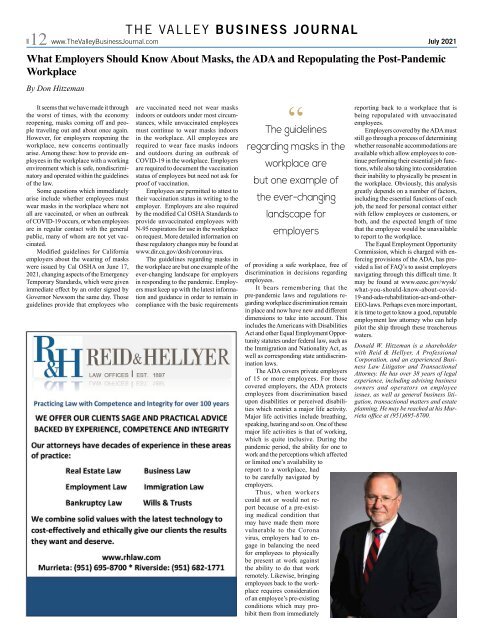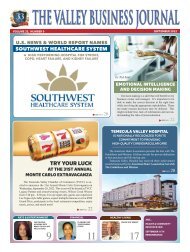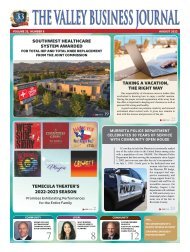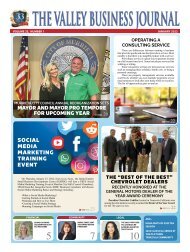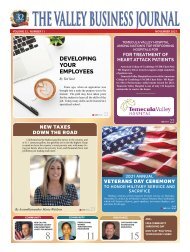Create successful ePaper yourself
Turn your PDF publications into a flip-book with our unique Google optimized e-Paper software.
THE VALLEY BUSINESS JOURNAL<br />
12 www.TheValleyBusinessJournal.com<br />
<strong>July</strong> <strong>2021</strong><br />
What Employers Should Know About Masks, the ADA and Repopulating the Post-Pandemic<br />
Workplace<br />
By Don Hitzeman<br />
It seems that we have made it through<br />
the worst of times, with the economy<br />
reopening, masks coming off and people<br />
traveling out and about once again.<br />
However, for employers reopening the<br />
workplace, new concerns continually<br />
arise. Among these: how to provide employees<br />
in the workplace with a working<br />
environment which is safe, nondiscriminatory<br />
and operated within the guidelines<br />
of the law.<br />
Some questions which immediately<br />
arise include whether employees must<br />
wear masks in the workplace where not<br />
all are vaccinated, or when an outbreak<br />
of COVID-19 occurs, or when employees<br />
are in regular contact with the general<br />
public, many of whom are not yet vaccinated.<br />
Modified guidelines for California<br />
employers about the wearing of masks<br />
were issued by Cal OSHA on June 17,<br />
<strong>2021</strong>, changing aspects of the Emergency<br />
Temporary Standards, which were given<br />
immediate effect by an order signed by<br />
Governor Newsom the same day. Those<br />
guidelines provide that employees who<br />
are vaccinated need not wear masks<br />
indoors or outdoors under most circumstances,<br />
while unvaccinated employees<br />
must continue to wear masks indoors<br />
in the workplace. All employees are<br />
required to wear face masks indoors<br />
and outdoors during an outbreak of<br />
COVID-19 in the workplace. Employers<br />
are required to document the vaccination<br />
status of employees but need not ask for<br />
proof of vaccination.<br />
Employees are permitted to attest to<br />
their vaccination status in writing to the<br />
employer. Employers are also required<br />
by the modified Cal OSHA Standards to<br />
provide unvaccinated employees with<br />
N-95 respirators for use in the workplace<br />
on request. More detailed information on<br />
these regulatory changes may be found at<br />
www.dir.ca.gov/dosh/coronavirus.<br />
The guidelines regarding masks in<br />
the workplace are but one example of the<br />
ever-changing landscape for employers<br />
in responding to the pandemic. Employers<br />
must keep up with the latest information<br />
and guidance in order to remain in<br />
compliance with the basic requirements<br />
“ The guidelines<br />
regarding masks in the<br />
workplace are<br />
but one example of<br />
the ever-changing<br />
landscape for<br />
employers<br />
of providing a safe workplace, free of<br />
discrimination in decisions regarding<br />
employees.<br />
It bears remembering that the<br />
pre-pandemic laws and regulations regarding<br />
workplace discrimination remain<br />
in place and now have new and different<br />
dimensions to take into account. This<br />
includes the Americans with Disabilities<br />
Act and other Equal Employment Opportunity<br />
statutes under federal law, such as<br />
the Immigration and Nationality Act, as<br />
well as corresponding state antidiscrimination<br />
laws.<br />
The ADA covers private employers<br />
of 15 or more employees. For those<br />
covered employers, the ADA protects<br />
employees from discrimination based<br />
upon disabilities or perceived disabilities<br />
which restrict a major life activity.<br />
Major life activities include breathing,<br />
speaking, hearing and so on. One of these<br />
major life activities is that of working,<br />
which is quite inclusive. During the<br />
pandemic period, the ability for one to<br />
work and the perceptions which affected<br />
or limited one’s availability to<br />
report to a workplace, had<br />
to be carefully navigated by<br />
employers.<br />
Thus, when workers<br />
could not or would not report<br />
because of a pre-existing<br />
medical condition that<br />
may have made them more<br />
vulnerable to the Corona<br />
virus, employers had to engage<br />
in balancing the need<br />
for employees to physically<br />
be present at work against<br />
the ability to do that work<br />
remotely. Likewise, bringing<br />
employees back to the workplace<br />
requires consideration<br />
of an employee’s pre-existing<br />
conditions which may prohibit<br />
them from immediately<br />
reporting back to a workplace that is<br />
being repopulated with unvaccinated<br />
employees.<br />
Employers covered by the ADA must<br />
still go through a process of determining<br />
whether reasonable accommodations are<br />
available which allow employees to continue<br />
performing their essential job functions,<br />
while also taking into consideration<br />
their inability to physically be present in<br />
the workplace. Obviously, this analysis<br />
greatly depends on a number of factors,<br />
including the essential functions of each<br />
job, the need for personal contact either<br />
with fellow employees or customers, or<br />
both, and the expected length of time<br />
that the employee would be unavailable<br />
to report to the workplace.<br />
The Equal Employment Opportunity<br />
Commission, which is charged with enforcing<br />
provisions of the ADA, has provided<br />
a list of FAQ’s to assist employers<br />
navigating through this difficult time. It<br />
may be found at www.eeoc.gov/wysk/<br />
what-you-should-know-about-covid-<br />
19-and-ada-rehabilitation-act-and-other-<br />
EEO-laws. Perhaps even more important,<br />
it is time to get to know a good, reputable<br />
employment law attorney who can help<br />
pilot the ship through these treacherous<br />
waters.<br />
Donald W. Hitzeman is a shareholder<br />
with Reid & Hellyer, A Professional<br />
Corporation, and an experienced Business<br />
Law Litigator and Transactional<br />
Attorney. He has over 38 years of legal<br />
experience, including advising business<br />
owners and operators on employee<br />
issues, as well as general business litigation,<br />
transactional matters and estate<br />
planning. He may be reached at his Murrieta<br />
office at (951)695-8700.


